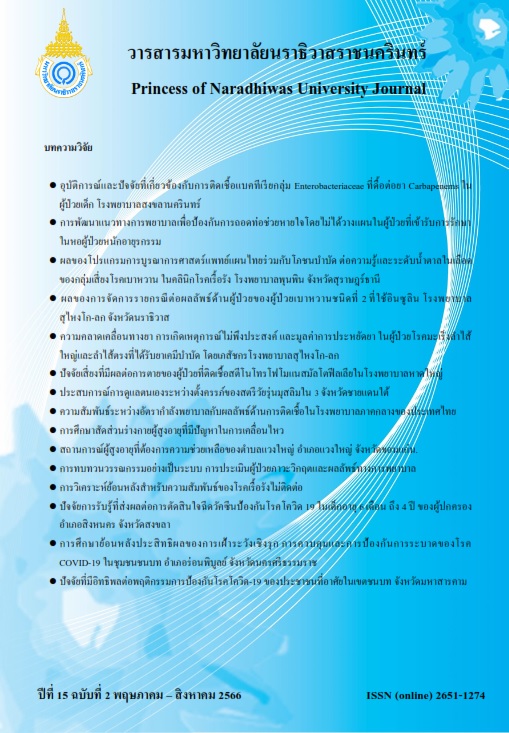The Effects of an Integrating Thai Traditional Medicine Model and Nutrition Therapy to Knowledge and Fasting Blood Sugar on the Diabetes Risk Group in Non-Communicable Disease Clinic, Phunphin Hospital, Suratthani Province
Keywords:
Thai traditional medicine, Nutrition therapy, Fasting blood sugar levelAbstract
This quasi-experimental research as two-group, pre-posttest design aimed to compare between knowledge and blood glucose levels before and after the Thai integration program, A traditional medicine combined with nutritional therapy program. This compared between the experimental and control group. The sixty samples were diabetic risk patients’ group who received services at chronic disease clinic of Phun Phin Hospital, Surat Thani Province. The research instruments consisted of 1) the Thai integrating traditional medicine program with nutrition therapy, 2) media teaching model, and 3) nutritional counseling manuals. The validity were done by 3 experts, CVI = 0.98. The research tools consisted of 1) an assessment questionnaire for knowledge on the use of herbs to reduce sugar levels, dining and self-care 2) blood glucose level assessment, CVI value = 0.97. The confidence value of the comprehension questionnaire using KR-20 was 0.86. Data analysis was descriptive statistics, compared by t-test and paired t-test.
The results revealed that the experimental group had the average knowledge scores on the use of herbs to reduce sugar levels, dining and self-care was higher than the control group, but the blood sugar level was lower than the control group. When compared within the experimental group, it was found that the knowledge of using herbs to reduce sugar levels, dining and self-care after the experiment was higher than before the experiment, but the blood sugar level was lower than before the experiment.
References
American Diabetes Association. (2017). Classification and Diagnosis of Diabetes. Diabetes Care. Retrieved November 14, 2022, from https://diabetesjournals.org/care/article/40/Supple ment_1/S11/36898/2-Classification-and-Diagnosis-of-Diabetes
Chih, Y.W., Neng, C.Y., Wayne, H.H., Shih, T.T., & Tong, Y.T. (2014). Team care of type 2 diabetes mellitus in Taiwan. Diabetes Resarch and Clinical Practice, 106(2), 309-313.
Eliasson, B., & Gudbjörnsdottir, S. (2014). Diabetes care – improvement through measurement. Diabetes Research and Clinical Practice, 106(2), 291-294.
Ezzatvar, Y., & García-Hermoso, A. (2022). Global estimates of diabetes-related amputations incidence in 2010–2020: A systematic review and meta-analysis. Diabetes Research and Clinical Practice. journal homepage: 2022 January. Retrieved November 14, 2022, from http//www.journals.elsevier.com/diabetes-research-and-clinicapractice.
Kurnia, A.D., Amatayaku, A., Karuncharernpanit, S. (2017). Diabetes self-management among adults with type 2 Diabetes Mellitus in Malang, Indonesia. International Journal of Tropical Medicine, 12(2), 25-8.
Mickute, M., Zaccardi, F., Razieh, C., Sargeant, J., Smith, A.C., Wilkinson, T.J., …Yates, T. (2022). Individual frailty phenotype components and mortality in adults with type 2 diabetes: A UK Biobank study. Diabetes Research and Clinical Practice. 195(2023), 110155
Qingshan, H.E., Jiaran, Z., Guojun, Y., Xiufei, L., Lu, L., Yuren, W., …Hua, Q. (2022). Serum Annexin A2 concentrations are increased in patients with diabetic cardiomyopathy and are linked to cardiac dysfunctions. Diabetes Research and Clinical Practice. 195(2023), 110196.
Rujiganjanarat, K., Hemtong, W., Parno, P., Tuni, P., Anantasirisataporn, T., & Kintong, S. (2018). An Application of Thai Traditional Medicine Program for Promote Healthy Behaviors among Elderly Group with Diabetes in Phetchaburi Province. Royal Thai Army Medical, 71(3)183-191.
Sukwatjanee, A., & Amatayakul, A. (2019). Health Management of Diabetes Risk Group in Ban Muang Whan: A Qualitative Research Perspective. Journal of Nursing Science Chulalongkorn University, 31(3), 19-32.
Suttithum, W., Wittayapun, Y., & Kalampakorn, S. (2018). Impact of a Specially Designed Self-Care Programme on Self-Care Behaviour and the A1c Haemoglobin Level in Type-2 Diabetes Patients at Laan Saka Hospital. Thai Journal of Nursing Council, 31(1), 19-31.
Suwattanakul, T. (2018). Factors related to blood sugar control among Diabetes Mellitus type 2 patients. Journal of Health Systems Research, 12(3), 515-22.
Thai National Health Examination Survey V Study Group. (2016). Thai National Health Examination Survey, NHES V. Nonthaburi, Thailand: National Health Examination Survey Office, Health System Research Institute; 2016. Retrieved November 14, 2022, from https://kb.hsri.or.th/dspace/handle/11228/4604?locale-attribute=th
Tong, Y.T., & Shih, T.T. (2013). Proceedings of the 2013 International Forum on Policy and Quality. Management of Diabetes, 106(2), 281-332.
Zhang, P., Zhang, X., Brown, J., Vistisen, D., Sicree, R., Shaw, J., & Nichols, G. (2010). Global healthcare expenditure on diabetes for 2010 and 2030. Diabetes research and clinical practice, 87(3), 293-301.
Additional Files
Published
How to Cite
Issue
Section
License
Copyright (c) 2023 Princess of Naradhiwas University Journal

This work is licensed under a Creative Commons Attribution-NonCommercial-NoDerivatives 4.0 International License.




